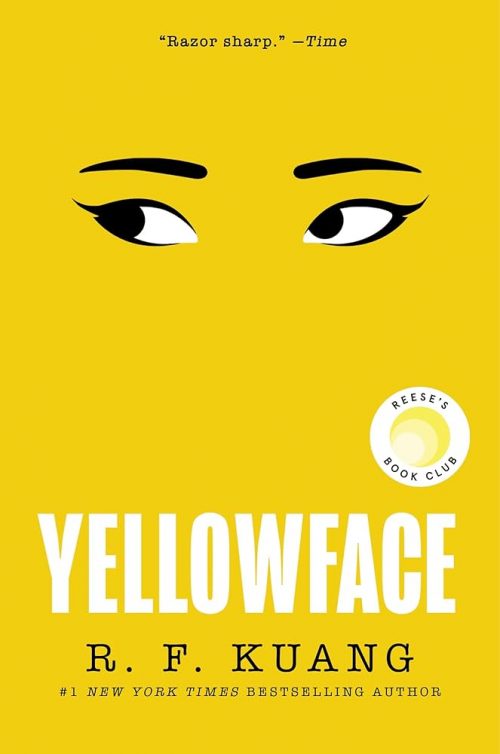Recent hits: R.F. Kuang’s Yellowface
After reading an inordinately high amount of ancient, medieval and early modern literature (as I have been accustomed to), reading new and contemporary literature becomes much-needed. In The Guardian’s new paperback recommendations for May, I found Yellowface. After reading the four-word pitch, “a wickedly funny publishing thriller”, my interest was piqued. Not to mention, I’d read one of Kuang’s books, Babel (which I would highly recommend if immersive anti-colonialist historical fantasy and fiction is something you like the sound of), which I absolutely adored. “How about another dive into the Kuang-verse?”, I said to myself, and borrowed my friend’s copy of Yellowface to hopefully get a breath of fresh air.
I did get it. This breath of fresh air. Yellowface is a real page-turner in every sense of the phrase. The writing style here is seamless and fast-paced, and the subject matter highly provocative. It doesn’t feel like a 320-page book, really. Before you know it, you’re eight chapters in.
In terms of the provocative subject matter, here we have failed-writer June Hayward, who tragically witnesses her friend (successful writer) Athena Liu’s death as she chokes on half-cooked pancakes. After seeing an unfinished manuscript of one of Athena’s prospective novels, June takes it upon herself to fulfil Athena’s legacy and give the world a much-needed book, that would otherwise never see the light of day. At least this is what she tells herself.
The fact that Athena never really expressed this wish and was generally very particular about how she gets her books out is temporarily lost on June. It also becomes important to mention that Athena’s prospective novel was, in fact, Chinese historical fiction. Something that June, who was very much not Chinese and had no real education on Chinese history, had no qualifications to talk about. June shrugs this off for a few months as her book gets picked up by a prolific indie publishing house and becomes one of the most anticipated releases.
It’s during the book-tour that things get sour. June thinks she sees Athena in the audience during one of her talks. With this narrative decision, Kuang leans towards thriller-territory.
“What is so beautifully unique about this book is that it meanders between something so dull and real (the publishing process) and something that sounds like magical realism”
What is so beautifully unique about this book is that it meanders between something so dull and real (the publishing process) and something that sounds like magical realism. Between this space, what emerges is a highly thought-provoking and polarising book.
There are a few reasons why I would recommend this book, personally. First, the compelling character work. Kuang crafts June in such a meticulous and deliberate way that whether one sympathises with that character or not, one still feels inclined to follow their journey. June embodies a combination of low self-esteem and borderline narcissistic traits. She feels pangs of guilt whenever she meets Athena’s mother. She feels a sick thrill brought on by a feeling of authority when she humiliates a student in front of the entire classroom. To put it mildly, June is all over the place. Characters that are all over the place make a story more compelling, by associating it with the unreliable narrator trope and calling for an interesting and peculiar character-arc. Not the hero’s journey. Something entirely different.
Secondly, the voice of this book.
“This book is written in a way that is, in equal parts, relatable and insightful”
This book is written in a way that is, in equal parts, relatable and insightful. This perhaps comes in through the rather meta subject matter of this book. A book about publishing by an author who has been in the throes of the publishing world herself and emerged successful. It explores the vitriolic nature of social media today, especially discourse-related platforms Twitter and Reddit, as well as platforms for book-lovers, i.e., Goodreads, in a way that is refreshingly honest and true. All with a focus on writers, in particular.
Lastly, the more intricate motifs. The one that stood out to me the most was the significance of Athena’s influence on June. It almost feels as though June is tethered to Athena. As if she feels worthless without her. Borrowing from Athena in the first place, results in self-doubt. The initial victory, the sensation the book was, does not matter. Self-doubt, as it always tends to, emerges victorious.
In the end, would I agree with The Guardian in calling Yellowface a “wickedly funny publishing thriller”? I think I would. It is hilarious in a wicked and twisted way, and it turns the publishing process and the publishing world, at large, into a thriller. A suspense-thriller mind you. If this book gets adapted for film, I would imagine it being an indie-film with a classical music and jazz soundtrack and extremely poignant imagery. Check out Yellowface, if all this sounds potentially exciting. Or indeed, check out something new, something which is like nothing you’ve ever read before. Explore!

Comments